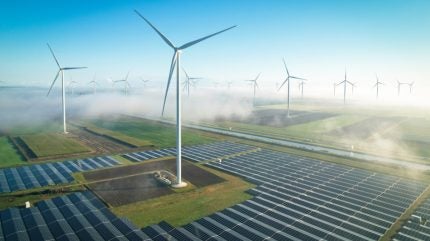
Doubling renewable power capacity additions to 122GW annually by 2050 is critical for achieving the European Union’s (EU) energy and climate targets, according to the first Regional Energy Transition Outlook by the International Renewable Energy Agency (IRENA).
IRENA published the outlook in collaboration with the European Commission (EC).

Discover B2B Marketing That Performs
Combine business intelligence and editorial excellence to reach engaged professionals across 36 leading media platforms.
The report projects that the EU power sector could generate 70% of its electricity from renewables by 2030, with this figure rising to nearly 90% by 2050.
However, this shift requires an estimated investment of €5.6tn ($6.4tn) by 2050, particularly for power sector capacity and infrastructure. This funding represents a nearly 50% increase from current levels, averaging €220bn a year.
IRENA director-general Francesco La Camera said: “Investing in the energy transition within the EU is a no-regrets option.
“The EU economy could grow by 2% annually until 2050 and boost energy sector jobs to nearly eight million within this decade. By placing low-cost renewables at its heart, the transition can enhance energy independence and deliver affordable, sustainable energy to industry, households, communities, and citizens across the EU.”

US Tariffs are shifting - will you react or anticipate?
Don’t let policy changes catch you off guard. Stay proactive with real-time data and expert analysis.
By GlobalDataInvesting in modern infrastructure is key to maintaining electricity affordability, as the expansion of renewables typically leads to reduced wholesale prices.
A fully decarbonised energy system could offer greater price stability, with total investments for the EU energy transition reaching €1tn annually by 2050, around 6% of the EU’s GDP last year.
Despite the momentum, the pace of renewable technology deployment is not meeting the necessary targets.
The IRENA report calls for increased renewable energy shares, with a target of 42.5% of Gross Final Energy Consumption by 2030 through accelerated electrification and direct use of renewables.
It advocates for a significant increase in wind and solar capacity, reaching at least 1100GW, 46GW battery storage capacity, and electric mobility, reaching 100 million electric vehicles by 2030, alongside the development of regulatory and investment frameworks for hydrogen hubs and large-scale electrolysis.
EU Energy and Housing Commissioner Dan Jørgensen said: “This report provides a clear compass for our energy transition. It will help us implement our Action Plan for Affordable Energy, which sets an ambitious strategy to cut energy costs while building a clean, competitive, and secure Energy Union.”





